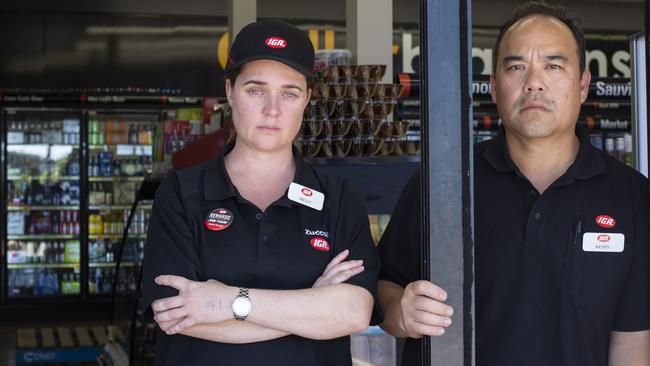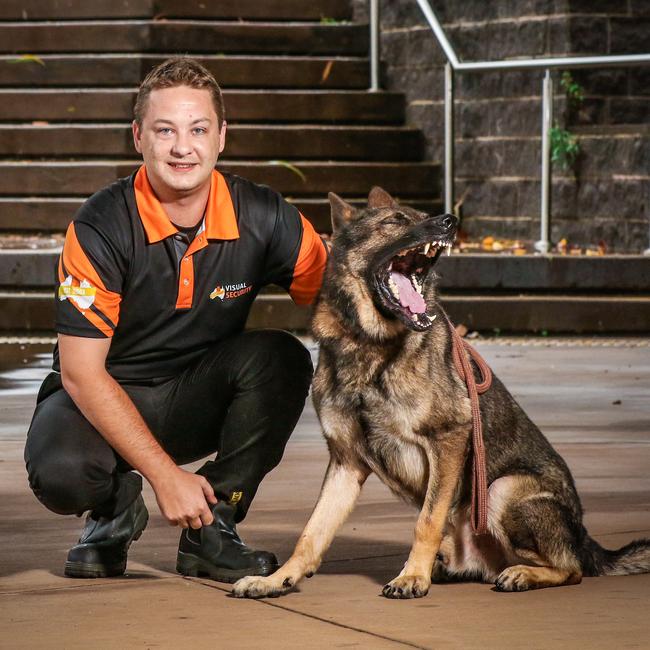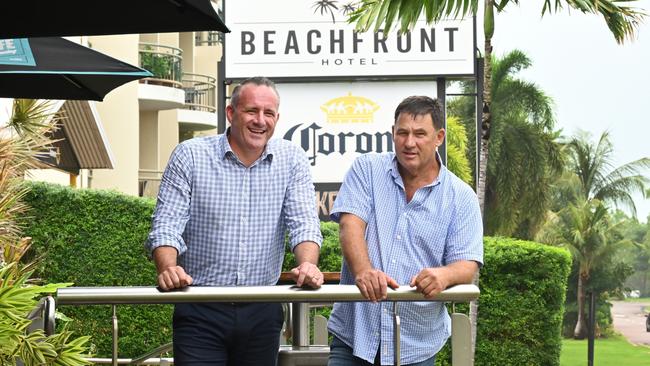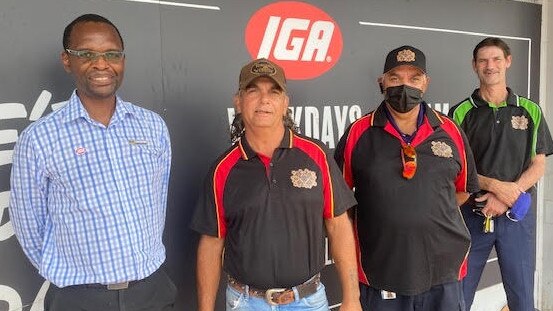NT BWS stores close early, Airport Tavern shut indefinitely after Declan Laverty death
BWS has changed its operating hours and the drive-through where Declan Laverty died will remain closed indefinitely, as the industry reacts to the government’s planned measures.
Business
Don't miss out on the headlines from Business. Followed categories will be added to My News.
BWS stores across the Northern Territory will adjust their opening hours in the wake of bottleshop worker Declan Laverty’s death.
The alcohol stores, owned by parent company Endeavour Group, will close at 6pm.
The change will apply to all stores while the company conducts a full internal review in the wake of the tragedy.
The Airport Tavern drive-through in Jingili where Declan was allegedly murdered will remain closed indefinitely.
It follows BWS stores in the NT closing Monday and Tuesday after the worker’s death.
It comes as alcohol shop owners and workers left shaken and grieving the loss of one their own welcome new security policies after Declan’s death.
But some have called for more clarity about how it will practically keep staff safe.
Zuccoli IGA and Cellarbrations owner Shelly Lay’s voice quivered as she described the grief, shock and fear felt by all bottleshop owners following the fatal stabbing of 20-year-old Declan on Sunday evening.
As a bottle shopowner, employer and a mother of a teenage boys, Ms Lay said Declan’s death “hits close to home”.
“All bottleshop owners feel like we’ve lost one of our own,” she said through tears.
“It’s hit the Territory community so hard because everyone knows a bottleshop worker.
“We all know someone that this could have actually happened to.
“I just wish that the love the community has, and the emotion we’re all feeling, could bring him back.”

On Wednesday, Chief Minister Natasha Fyles announced a suite of measures, including funding for bottleshops to boost security through guards armed with capsicum spray and “environmental design” funding.
For Ms Lay, the funding would be a relief for her business that already forks out $4000 a week on a security guard and dog.
Ms Lay said she took the “extreme measure” after being broken into four times in four months — with one incident involving a dramatic ram raid snatch-and-grab.
When asked if security guards were a realistic expense across the industry, Ms Lay said “it has to be to keep their staff safe”.
“We used to say ‘nothing is worth you being injured’, now we’re saying ‘nothing is worth your life’,” she said.
“I don’t think in any other state I’ve ever thought of a bottleshop worker as somebody who could be killed.”

Ms Lay said she was still looking into her options following the new policies, saying the announcement lacked details for businesses.
She said last time the Alcohol Secure program funding ran out before she was able to put in her quotes for roller shutters.
Ms Lay said de-escalation training for workers was appreciated but wondered if it would be enough to protect her staff.
“Would it have saved Declan’s life with that training? We’ll never know,” she said.
Ms Lay questioned why proposed bail changes — which could remove the presumption of bail for some weapon offences — were limited to knives and other edged weapons.
“A metal bat is just as dangerous as a sharp knife,” she said.
But she added solutions also needed to look at alcohol treatment services, whether in the community or within the judicial system.
“These people, they need help from somewhere in the system,” she said.

Endeavour Group, the owner of BWS including the Airport Tavern where Declan died, said they had begun a “full internal review” of the safety of their Territory stores.
“This is a tragedy that has affected out teams, not just in the NT, but right across the country,” chief executive Steve Donohue said.
Mr Donohue said the Airport Tavern BWS store would remain closed until further notice, while other stores had reopened with reduced hours and increased security.
Lhere Artepe Supermarkets chief executive Temba Ncube welcomed most of the measures, particularly around de-escalation training education and the increased police presence.
Mr Ncube, who operates three Alice Springs IGA, said he had searched for months to find an Alice Springs-based service to train his staff in staff de-escalation strategies.

He said the supermarkets had previously contracted extra security due to workers’s safety concerns.
“Here in Alice Springs we are fortunate that here in our liquor stores there are police, what we have been saying is that police are not here to provide us with security, they are there for public order,” Mr Ncube said.
“But we are very happy in retail that more police will be around.”
However, Mr Ncube questioned whether environmental safety measures, such as perspex glass, would work in practicality.
“If you have it in a takeaway liquor outlet you would have to hire more staff to go in and get the orders if no customers can go into the cool room,” he said.
“It can work in service stations, but I’m not sure about retail.”
Coles Liquor, which owns Liquorland, First Choice, Liquor Market and Vintage Cellars, said in addition to the new Territory government measures, security guards would be deployed at all their Territory stores.
It is understood that some Coles-owned stores already had guards in place.
“All our Northern Territory team members are being offered counselling and additional training to support their safety and wellbeing,” a spokeswoman said.
Retail Drinks Australia, the peak body representing packaged retail liquor stores, said it welcomed the new “short-term” policy measures.
Policy and advocacy head Jonathan Russell said the stop-gap measures would help but called for industry groups to be consulted for longer term strategies to address the “root causes” of crime.
Mr Russell said violence against workers was a rising trend across Australia, with the dangers going “beyond one industry”.
He said it was important the new policies were not just limited to liquor outlets but other businesses experiencing anti-social behaviour.




